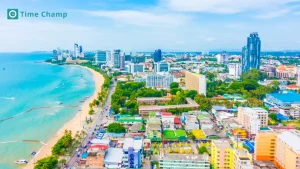Argentina, the second-biggest country in South America, continues to be known for its variety of natural landscapes. The country stands out because of its famous landmarks, Iguazú Falls and Mount Aconcagua, which help maintain robust farming, tourism and energy sectors.
According to World Salaries, the average salary in Argentina is ARS 541,700 approximately $478.96.
This blog covers average salaries in Argentina, what factors impact them, the cost of living there, and if outsourcing businesses to Argentina is worth it or not.
Monthly and Annual Salary Overview in Argentina
Average Salary in Argentina
According to the World Salaries the average salary in Argentina is ARS 541,700 approximately equals to $503.93 per year in 2025.
The average monthly salary in Argentina in 2025 is ARS 45,141 per month which approximately equals to $42.00.
This reported figure combines salaries from various industries and job types throughout Argentina to provide a national overview of annual worker earnings.
Minimum Wage
According to Official portal of Argentina, the minimum wage in Argentina raised from 292,446 ARS to 296,832 ARS starting March 2025.Over the last 55 years, the amount of the minimum wage in Argentina has averaged 8,913 ARS per month. The highest earnings were in March 2025, and the lowest in February 1965.
Median Salary
The median salary is the middle point in the income of Employees. It represents the salary where half of the workers earn less, and half earn more.
In Argentina, the median salary is ARS 499,300 ($441.65) per year. This means that about half of the workers earn less than ARS 499,300 annually, while the other half earn more than ARS 499,300.
Want to manage employee work hours and productivity?
Try Time Champ, your smart solution for global time tracking.
Signup for FreeBook DemoFactors That Affect Salaries
Here are the main factors that affect salaries in Argentina,
Based on Education and Skills
People who have higher degrees earn more salaries than people with lower degrees. The salary range varies with Education. Here is how;
| Education Level | Salary Increase Compared to Previous Level |
|---|---|
|
High School (Secondary)
|
0% (Base Salary)
|
|
Certificate/Diploma
|
+17%
|
|
Bachelor’s
Degree
|
+25%
|
|
Master’s
Degree
|
+30%
|
|
PhD
|
+22%
|
Source: World Salaries.com
High School Diploma
This is the baseline salary. It refers to the people who only completed their high school education. This is usually the lowest salary range in many professions.
+17% (Certificate or Diploma Holders)
A person who holds a certificate or diploma earns 17% more than someone who only completed high school.
+25% (Bachelor’s Degree Holders)
People who finish post-secondary certificate or diploma programs receive 17 percent more income than those who stop at high school.
+30% (Master’s Degree Holders)
People who finish a Master’s degree will receive 30 percent more than people with only a bachelor's degree.
+22% (PhD Holders)
People who finish a PhD will get 22 percent more than those people who have Master’s degree.
Source:World Salaries.com
Based on Experience and Seniority
Salaries in Argentina tend to grow as people gain more experience. The longer someone stays in their job role, the more knowledge they acquire, which leads to improved performance. The increased knowledge gained from work experience leads organizations to provide higher compensation.
The table below shows salary ranges according to work experience.
| Experience Level | Estimated Salary Range (ARS/year) | Estimated Salary Range (USD/year) |
|---|---|---|
|
0–2 years
|
ARS 500,000 – ARS 550,000
|
$442.26-486.49
|
|
2–5 years
|
ARS 650,000 – ARS 710,000
|
$574.94-628.02
|
|
5–10 years
|
ARS 900,000 – ARS 950,000
|
$796.08-840.30
|
|
10–15 years
|
ARS 1,100,000 – ARS 1,130,000
|
$972.98-999.52
|
|
15–20 years
|
ARS 1,200,000 – ARS 1,230,000
|
$1061.43-1087.97
|
|
20+ years
|
ARS 1,290,000 – ARS 1,310,000
|
$1141.04-1158.73
|
Source:World Salaries.com
Based on Industry and Job Sector
The industry and job sectors play a key role in determining salary levels in Argentina. Here is how the salary is distributed among them.
| Job Sector | Industry | Salary(ARS) | Salary(USD) |
|---|---|---|---|
|
Account Examiner
|
Accounting and Finance
|
283,700
|
250.94
|
|
Account Executive
|
Accounting and Finance
|
514,300
|
454.91
|
|
Accountant
|
Accounting and Finance
|
398,300
|
352.91
|
|
Accounting Analyst
|
Accounting and Finance
|
498,500
|
440.94
|
|
Accounting Assistant
|
Accounting and Finance
|
315,700
|
279.25
|
|
Accounting Associate
|
Accounting and Finance
|
286,400
|
253.33
|
Based on Economic Conditions
When Argentina has a good or growing economy, more businesses open, people get jobs more easily, and companies earn more money. This helps to increase the salaries, as employers can afford to pay more and compete to keep good workers.
But when the economy is falling, things get harder, and companies may stop hiring or even lay off the employees. Since businesses aren’t making much money, they may not increase salaries or might even reduce them.
So, how much people earn in Argentina often depends on how strong or weak the economy is.
Based on Location
As of April 2025, the exchange rates are:
| City | Average Salary(ARS) | Average Salary(USD) |
|---|---|---|
|
Avellaneda
|
545,300 ARS
|
1,514.81 USD
|
|
Bahia Blanca
|
581,000 ARS
|
1,613.98 USD
|
|
Buenos Aires
|
623,700 ARS
|
1,732.60 USD
|
|
Cordoba
|
619,000 ARS
|
1,719.54 USD
|
|
Corrientes
|
585,900 ARS
|
1,627.59 USD
|
|
La Plata
|
608,500 ARS
|
1,690.37 USD
|
Source:World Salaries.com
Based on Gender
Women in Argentina earn less money than men earn in all professional fields. In Argentina, male employees earn an average of 555,800 ARS($491.62), while female employees earn 524,700 ARS ($464.11). This means that men earn generally 6% more than women on average across all professions.
Examples:
| Profession | Male Average Annual Salary (ARS) | Female Average Annual Salary (ARS) | Salary Difference (%) |
|---|---|---|---|
|
Data Analyst |
531,700 |
491,000 |
8% less for females |
|
Web Content Specialist
|
615,000
|
559,000
|
10% less for females
|
|
Data Scientist
|
890,100
|
851,200
|
5% less for females
|
|
Economist
|
906,000
|
862,400
|
5% less for females
|
|
Cosmetologist
|
341,900
|
376,800
|
9% more for females
|
Source:World Salaries.com
How Much Does It Cost to Live in Argentina?
Living outside of the big cities is cheaper because smaller towns and rural areas usually have lower housing and utility costs.
According to Numbeo, the cost of living in Argentina in 2025 is,
Housing Costs
Housing in Argentina can be affordable compared to many other countries, but the cost really depends on where you live.
Big Cities (like Buenos Aires)
- Renting a 1-bedroom apartment in the city center costs around ARS 565247.47 to ARS 904395.96($500 to $800) per month. If you move just outside the center, the rent drops to ARS 339148.48 to ARS 904395.96($300 to $500).
- A 3-bedroom apartment in the city center can cost between ARS 1017445.45($900) and ARS 1695742.43($1,500) per month.
- Buying a home in Buenos Aires can be expensive. It usually costs around ARS 2,284,832.71 to ARS 4,570,030.34($2,000 to $4,000) per square meter in the center.
Smaller Cities like Córdoba or Mendoza
- The cost of living in Córdoba and Mendoza is less compared to Buenos Aires.
- A one-bedroom apartment rental costs between ARS 228,517.05 and ARS 457,030.79($200 and $400) each month.
- Buying property here is also more affordable, starting at 1,142,495.65 to ARS 2,284,832.71 ($1,000 to $2,000) per square meter.
Healthcare
As of April 2025, healthcare costs in Argentina have changed a lot because of new government rules and money problems in the country. Health insurance plans in Argentina can cost different amounts depending on the things like your age, where you live, and what services are included.
Public Healthcare
The public healthcare system gives free medical services to everyone living in the country. But under President Javier Milei, the government made big budget cuts, which led to not enough medical supplies, longer wait times for appointments, and more stress on doctors and nurses.
Private Healthcare
- Basic private health insurance plans in Argentina cost between ARS 45,699.83 and ARS 57,124.92 ($40 and $50)each month.
- A regular doctor visit costs about ARS 22,850.66 to ARS 57,124.92($20 to $50) if you don’t have any insurance, and seeing a specialist or getting hospital care usually costs high.
Food and Groceries
In Argentina, food and grocery prices have been going up because of higher living costs, but it’s still cheaper compared to many other countries.
- The prices of groceries in Argentina changes based on what consumers purchase. Bread together with eggs and milk remain reasonably priced but meat costs and some vegetable and fruit prices have increased.
- A single person's monthly grocery expenses in Argentina range between ARS 347,284.89($304) and ARS 499,269.28($437) based on their eating habits and their geographical location.
Transportation
According to Bueno Saire Sherald the transportation costs in Argentina are,
- The basic cost for bus transportation amounts to ARS 371 which equals $0.30 for distances under 3 kilometers. The price for bus rides increases with distance traveled so that journeys increasing 12 kilometers cost ARS 547($0.47).
- A one-way subway trip costs ARS 757 (approximately $0.76) for users with a registered SUBE card.
- Train prices would change depending on the line and distance. For example, a train ride from the city center to a suburban area may cost around ARS 280 (approximately $0.28).
Is Argentina the Right Place for Outsourcing?
Yes, and here’s why:
Skilled Workers
Argentina has many skilled and educated people who are good at jobs like computer work, helping customers, and creative tasks like design. The developed education system and growth in the tech sector have created a team of flexible and skilled workers. Because many professionals speak fluent English, they can be important members of international groups.
Cost-Effective Labor
The cost of workers and business costs in Argentina is much lower than in Europe and the U.S. Businesses can save money by getting good-quality work, especially in tech jobs, design services, and customer support roles.
Favored Time Zone for Collaboration
Communication and teamwork are easier because Argentina shares a similar time zone with North America. This makes it possible for the employees to work together and stay in touch during normal business hours.
Reliable Technology and Internet Access
In Argentina, many cities have fast and stable internet connections, which is really important for the businesses that work online. People in Argentina also use modern technology like computers, software, and online tools to do their jobs. This means that companies don’t have to worry about slow internet or tech problems when working with Argentinian workers.
High Proficiency in English
Most professional workers in Argentina can speak English, especially in big cities. Being able to speak English helps the companies to communicate clearly with their outsourced teams. When workers speak in English, it makes things easier and reduces the misunderstandings between team members.
Outsourcing to Argentina?
Use Time Champ to monitor remote teams, track performance, and boost results, all in one place.
Signup for FreeBook DemoTime Champ: The Smarter Way to Manage Global Teams
Managing a remote or outsourced team in Argentina? Staying productive across borders can be tricky, especially with different time zones, work cultures, and performance expectations.
That’s where Time Champ comes in.
Real-time Time Tracking: Monitor employee work hours instantly for accurate attendance.
Automatic Attendance Monitoring: Track check-ins and check-outs without manual input.
Productivity Analysis: Measure activity levels to understand employee efficiency.
Screenshot Capture: Take periodic screenshots to verify work progress.
Detailed Timesheets: Generate clear and comprehensive reports of work hours.
Payroll Integration: Sync attendance data directly with payroll and HR systems.
Project Management: Track time spent on specific tasks and projects.
Remote Team Support: Manage and monitor remote or hybrid workforce seamlessly.
Challenges of Outsourcing to Argentina
Here are a few problems businesses often meet when working with Argentina-based companies. Recognizing these can assist you in planning your activities to prevent any problems.
Economic Instability and Rising Prices
Argentina has faced a lot of economic struggles lately, including high price increases and an unstable currency. This makes it difficult for the businesses to predict costs and manage budgets. Quickly rising prices can make outsourcing less affordable and impact on overall savings.
Language and Cultural Differences
Although a large number of people in Argentina can speak English, Spanish remains the primary language. Multiple work challenges arise from cultural and work habits and communication style differences between teams operating across different countries. The lack of these situations creates misunderstandings between the team members.
Political and Regulatory Risks
The frequent governmental changes in Argentina create a situation where things are not always clear for the country. Businesses may face problems when rules, taxes, and laws change suddenly, making it hard to stay on track with their plans.
Conclusion
Argentina gives good chances for both workers and businesses. With a fair cost of living and a good average salary in Argentina, the country gets attention from workers, investors, and companies looking to hire people from other places.
Even though there are some problems like higher prices and changes in government, Argentina has smart workers, good technology, and a helpful time zone. This makes Argentina as a good place to grow. Whether you are looking for a job or thinking about hiring people from there, Argentina can be a good choice with the right plan.
Whether you're hiring in Argentina or managing global teams, Time Champ helps you stay productive and organized.
Start your free trial today.
Signup for FreeBook DemoFrequently Asked Questions
In Argentina, the typical working hours are from 9 AM to 6 PM, including a one-hour lunch break. The standard working hours differ between industries and companies, but tech and customer service sectors often increase their operations.
The most common outsourcing jobs in Argentina include IT development, customer support, marketing, graphic design, data analysis, and virtual assistance. Argentina is home to many talented professionals in these fields, making it a popular destination for outsourcing.
Foreigners wishing to work in Argentina must obtain a work visa. This visa is like a special permission that lets them work legally in the country. Without it, they can’t get a job in Argentina. Once they have the visa, they’re allowed to work just like anyone else who lives there.
In Argentina, most people get paid in the local money called Argentine pesos (ARS).
However, some international or foreign companies, especially ones that let people work remotely, might pay in U.S. dollars. This can be helpful because the value of the peso can change a lot. Still, getting paid in dollars is not very common and usually only happens in special jobs or international companies.







